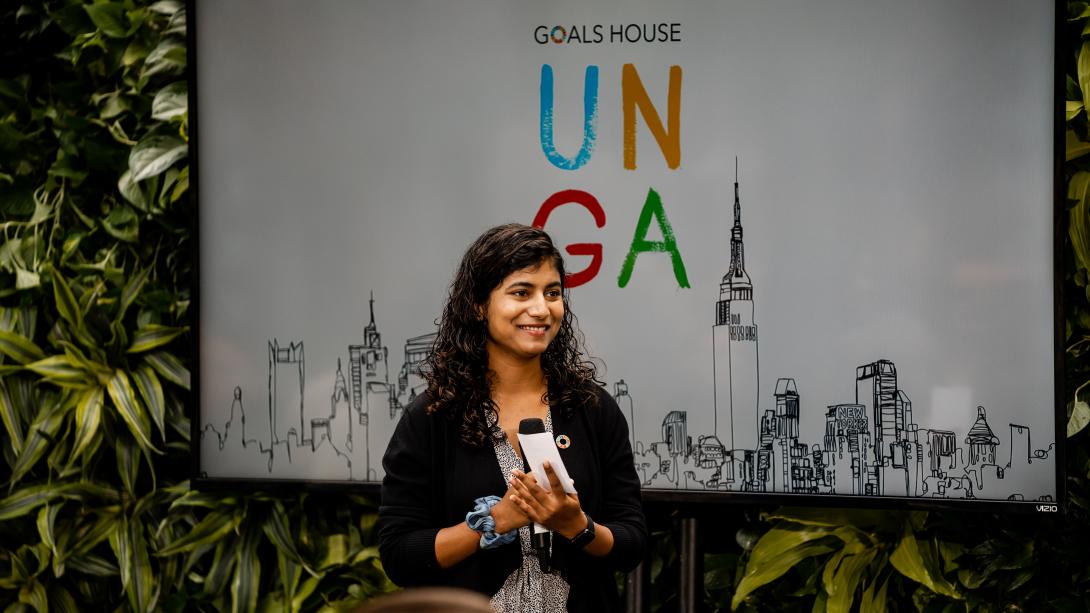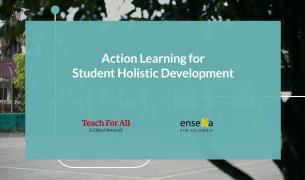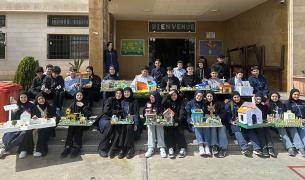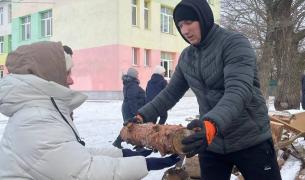Speaking up for students at the Transforming Education Summit

I never imagined speaking at the United Nations. This opportunity was huge and I could not be any more grateful to all my teachers and mentors who believed in me and encouraged me to speak at the 2022 Transforming Education Summit (TES). While it was a moment of pride and gratitude to be representing Teach For India and Akanksha with the Teach For All delegation, it was also extremely nerve-wracking that my voice at this Summit represented the voice of youth, especially those who come from underprivileged backgrounds. My heart was racing and my self-confidence fading, but the support of my teachers and mentors miles away in India filled me with the passion to share my story.
It was a three-day event, filled with inspiring conversations, voicing the need for systemic change within the sphere of education. My biggest takeaway from the first day of the Summit was the need to “decolonize” the curriculum that students learn in their classrooms. It was empowering to learn from people who have been historically colonized speaking about this topic on the very first day. As someone who comes from a colonized country and never learned about the consequences and the disturbing repercussions of colonization in her classroom, this was extremely relatable. The textbooks in my middle school focused on glorifying aspects of colonization (i.e. the freedom fighters) but never on the cultural and psycho-social exploitation of colonization on millions of people. I learned this by reading “non-academic” books that I would borrow from my teachers. It’s time to bring these conversations out in the open.
The concept of decolonizing education is related to another one of my takeaways from TES: the importance of defining learning as something more than reading and writing in English. In today's world, English fluency determines someone's class and status in society. Students from underprivileged backgrounds often struggle to read and write simple English, yet they must learn it to succeed in professional settings. I believe we need to shift this focus, because using English fluency as a defining factor for a person is wrong. Education systems can bring about this change, by supporting students who do not articulate well in English and giving them opportunities to express their thoughts in whichever language they are comfortable in. It is high time that we begin thinking, talking, and really bringing forth this change through education.
The second day of the Summit was the most stressful for me because I was one of the panelists on the side-event session Pathways to Transforming Education. I was seated among the CEOs of huge companies and the Education Ministers of Palestine and Burkina Faso. I was shivering, but I knew what I had to say and the importance of saying it—I was the only youth ambassador on the panel. I was asked three questions focusing on the importance of the relationship between teachers and students, the curriculum of subjects taught in my classes, and my perspective on the purpose of education. My main points were as follows:
- The relationship between teachers and students is significant and one that cannot be undermined, because it shapes the learning experience for the students. Thus, it is important to eliminate the traditional power dynamics between teachers and students and foster a learner-centered approach to teaching and learning. In Akanksha and Teach For India classrooms, I experienced this when my teachers asked us to call them didis (sisters) or bhaiyas (brothers). This immediately shifted the dynamic and invited me to approach my teachers with any questions that I had and to open up about issues that I was facing. Additionally, this relationship further manifested when my teachers would ask for evaluations from my classmates and me, as they valued our feedback on how to improve the lessons that we were learning and the delivery of information.
- When sharing my thoughts on the curriculum I was taught, I spoke about the importance of eliminating competition among students that comes with the grading system. The focus of learning should be on the skills that students can gain and apply in their immediate communities and not on the ranking of As, Bs, and Cs. The dialogue around how curriculum can be taught through project-based learning is highly needed in our classrooms. I spoke about the project I worked on in my high school in India that focused on addressing anemia in young girls and women of rural Maharashtra as an example of experiential learning.
- Finally, when asked about the purpose of education I spoke about a really important chapter of my life—being a part of the “Maya” production and team. It was an 18-month program where I, along with 30 other students across the city of Pune, learned performing arts, including dancing, singing, and theatre, while also engaging in conversations about being a noble citizen through three main values: courage, compassion, and wisdom. While this learning experience is unique to my story, its implications are universal. The emphasis of the program was on equipping students with the necessary skill set for becoming leaders in their own communities through learned values, and providing and encouraging them with a range of possibilities to explore beyond the mainstream career paths. Today I know I can pursue dance and neuroscience because my teachers encouraged me to develop my skills in both. And I think that the purpose of education is precisely that—to offer students a range of possibilities we can explore, and not just confine us in one way!
It was extremely meaningful to see that when I spoke at the panel, people really listened to me, and agreed with what I said. That made a difference. Being a part of something so significant like the TES, was transformative. I stepped in as someone unsure about why I was there and stepped out as someone who had ideas and thoughts to talk about that the world ought to listen to!


